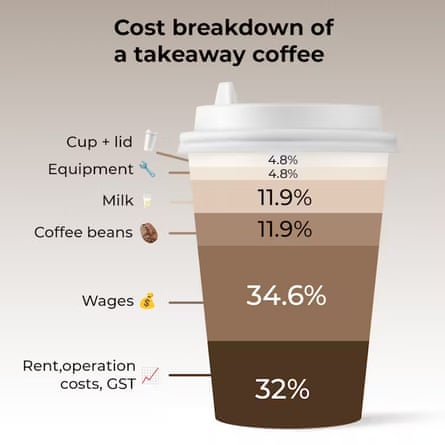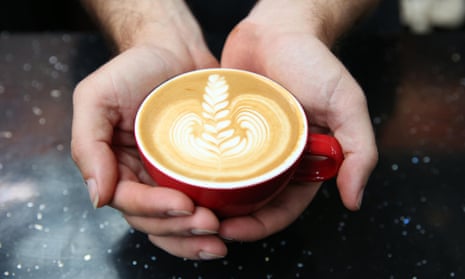If there’s one thing Australians like more than coffee, it’s whinging about the price of coffee.
The latest round of coffee-breathed howling started after a Melbourne roasting tsar said Australians should pay a minimum of $5.50 for a cup.
This followed the $7 cup outrage of 2022, closely followed by the $8.90 Barangaroo brew-haha.
So what is happening with coffee prices?
As the Conversation reported last month, a survey of Australian capital cities found the average price of a small takeaway flat white at speciality venues is $4.78. That is almost half the price found in some international capital cities, even after adjusting for local purchasing power parity.
Emma Felton, an adjunct senior researcher at the University of South Australia, wrote that if Australians did not value coffee properly, “we risk losing the internationally renowned coffee culture we’ve worked so hard to create, and the phenomenal quality of cup we enjoy”.
Lachlan Ward, the chief executive of St Ali coffee roasters, made essentially the same point to the Herald Sun this week when he said Australians should pay $5.50 minimum for a regular flat white (the dine-in cost is $6.50 at St Ali’s South Melbourne cafe).
“The way we are pricing coffee in Australia is not sustainable,” Ward told the Herald Sun. “Unless Australian cafes start adjusting prices up and charging a fair price for what we are making, the independent cafe won’t exist in the future …
“We have incredible operators and beautiful cafes closing down weekly, we can’t look at cutting prices.”
after newsletter promotion
Joe Taweel, the chair of the Australian Coffee Traders Association and general manager of Cofi-com Trading, a large wholesaler of green beans to Australian roasters, says a number of factors are combining to put pressure on the price of a cup of coffee.
He says wholesale prices for arabica coffee, the variety favoured in most Australian cafes, have almost doubled in the past five years.
These prices are in part inflated because of huge increases in the price for robusta, the variety used to typically make instant coffee and increasingly used as a percentage of coffee blends in North America and Europe.
Not only are roasters and cafes juggling these increased costs passed on by suppliers but they are having to cope with rising interest rates, which can put a squeeze on loan repayments or result in increased commercial rents.

Felton also notes that in the past year Australian wages have grown at their fastest rate since 2009, and electricity prices remain elevated after significant inflation, but could begin to fall mid-year.
That is without mentioning what is happening with consumers.
Taweel says it appears foot traffic around city cafes has not returned to pre-Covid levels, and that the pandemic also saw a shift to people purchasing high-end home barista equipment and therefore reducing their spending in cafes.
He says the price of a cup of coffee can never be adjusted as quickly as the market moves for wholesale beans, meaning roasters have to fix competitive prices with suppliers like him for several months in advance. This could result in difficulties for businesses if they do not estimate their costs effectively.
Taweel thinks it is reasonable to charge $4.50 to $5 for a cup of coffee but does not expect it can be sustained much higher.
“Competition won’t allow it,” he says. “You can’t sell $7 coffee when 7-Eleven sells it for a dollar.”
7-Eleven raised the price of a regular coffee in 2022, to $2. It cited rising costs for the decision.

Comments (…)
Sign in or create your Guardian account to join the discussion